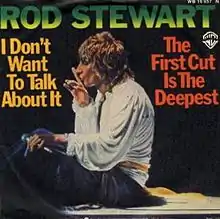I Don't Want to Talk About It
"I Don't Want to Talk About It" is a song written by Danny Whitten. It was first recorded by Crazy Horse and issued as the final track on side one of their 1971 eponymous album. It was Whitten's signature tune, but gained more fame via its numerous cover versions, especially that by Rod Stewart.
| "I Don't Want to Talk About It" | |
|---|---|
| Song by Crazy Horse | |
| from the album Crazy Horse | |
| Released | February 1971 |
| Genre | Country rock |
| Length | 5:18 |
| Label | Reprise |
| Songwriter(s) | Danny Whitten |
| Producer(s) | Jack Nitzsche, Russ Titelman, Bruce Botnick |
| "I Don't Want to Talk About It" | ||||
|---|---|---|---|---|
 | ||||
| Single by Rod Stewart | ||||
| from the album Atlantic Crossing | ||||
| A-side |
| |||
| Released | 1977 (Europe) 1979 (US) | |||
| Recorded | 1975 | |||
| Genre | Soft rock | |||
| Length | 4:13 (single version) | |||
| Label | Riva | |||
| Songwriter(s) | Danny Whitten | |||
| Producer(s) | Tom Dowd | |||
| Rod Stewart singles chronology | ||||
| ||||
| Music video | ||||
| "I Don't Want to Talk About It" on YouTube | ||||
Cover versions
In 1975, Rod Stewart recorded the song at Muscle Shoals Sound Studio in Sheffield, Alabama, for his album Atlantic Crossing. This became successful when it was released as a single. In the United States, it became a top fifty hit on the Billboard Hot 100 in early 1980 (#46 pop and #44 adult contemporary). In New Zealand, it peaked at #2; in the United Kingdom, it topped the UK Singles Chart as a double A-side with "The First Cut Is the Deepest" in 1977.[1] The song is widely believed to have benefitted from being deliberately released as a budget single in order to keep the Sex Pistols' "God Save the Queen" off the top of the UK Singles Chart.[2][3][4]
In 1989, Stewart recorded a new version of "I Don't Want to Talk About It" for Storyteller – The Complete Anthology: 1964–1990. It was later included on Downtown Train – Selections from the Storyteller Anthology and released as a single in 1990. It received extensive airplay on adult contemporary radio stations in the United States as an album cut, reaching number two on the Billboard Adult Contemporary chart. Stewart also sang this song as a duet with Amy Belle during his 2004 tour[5] and it is included in his concert DVD.
In June 1988, Everything but the Girl released their version as a single and it featured on the 1988 album Idlewild. This also met with success in the UK, peaking at number three on the UK Singles Chart. It was their first British top ten hit and would remain their only one until 1995, when the remix of "Missing" also peaked at number three. Tracey Thorn has said that Stewart had been regarded as "a heroic figure" in her home when she was growing up, and that her brother Keith owned the "albums with grimy-sounding titles like An Old Raincoat Won't Ever Let You Down, and Gasoline Alley". She herself had "always liked Atlantic Crossing."[6]
Also, in 1988, Arthur Conley, (famous for his 1967 hit "Sweet Soul Music") sang his version live on Dutch television. Conley had previously changed his name to Lee Roberts whilst living in The Netherlands.
Other notable artists who have recorded versions of this song include Blue, Rita Coolidge, Billie Jo Spears, Ian Matthews, Nils Lofgren, Dina Carroll, Joe McElderry, Geoff Muldaur, Llama Farmers, Alex Parks, Indigo Girls (on the Philadelphia soundtrack) and Andy Williams.
Original recording personnel
- Danny Whitten — guitar, lead vocals
- Nils Lofgren — guitar, backing vocals
- Ry Cooder — slide guitar
- Billy Talbot — bass guitar
References
- Roberts, David (2006). British Hit Singles & Albums (19th ed.). London: Guinness World Records Limited. pp. 339–40. ISBN 1-904994-10-5.
- Hall, James (27 May 2017). "God Save the Queen at 40: how the Sex Pistols made the most controversial song in history". The Telegraph. ISSN 0307-1235. Retrieved 1 January 2018.
- "God Save the Queen: The Sex Pistols take on charity track". ITV News. 19 April 2012. Retrieved 1 January 2018.
- "Bragg attacks Pistols' royal views". BBC News. 27 May 2002. Retrieved 1 January 2018.
- "Rod Stewart & Amy Belle- I Dont Want To Talk About It". Royal Albert Hall, London. 2004. Archived from the original on 26 September 2011. Retrieved 8 April 2012.
- Tracey Thorn, Bedsit Disco Queen, p.204